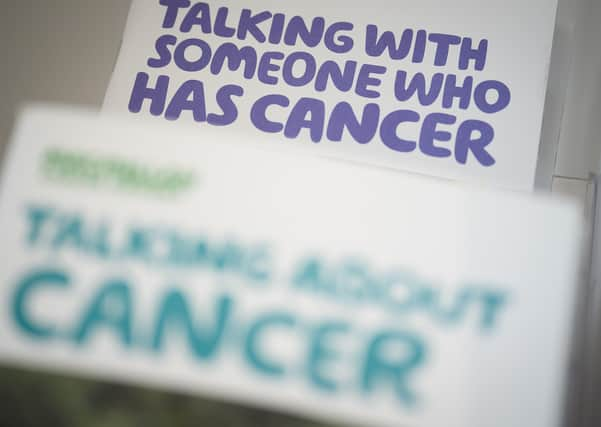Practical support when you look after someone with cancer


This month, Macmillan Cancer Support have provided some advice on the support that will be available to you to help you cope.
Support from others
It is a good idea to think about the kind of help you might need. This could be from family members, friends or a local support group. It is important you know who you can ask for help and what they could do. Having a good support network can make a big difference. Asking others for help is often the most sensible thing to do and is not a sign of failing. Try to talk openly with people about your role as a carer and the help you need. You do not have to protect others in your family by doing it all by yourself.
Support from health and social care professionals
Advertisement
Hide AdAdvertisement
Hide AdWho will I speak to? You may be in contact with different health and social care professionals. This is because the person you are caring for might have different needs. These professionals can support you as a carer. They can give you advice and direct you to different services that can help. There may be a main person for you to contact at the hospital called a key worker. You can contact them if there are problems. They may be a specialist nurse or social worker.
When the person you are caring for is diagnosed or having treatment, you may speak with:
a surgeon – who is a specialist in treating cancer with surgery
a cancer doctor (oncologist) – who is a specialist in cancer treatments
Advertisement
Hide AdAdvertisement
Hide Adspecialist nurses – who can give you information and support.
At other times you may also speak to:
a GP – who is responsible for the healthcare of the person you are caring for at home
district nurses – who support people at home
social workers – who assess the practical and social help you or the person you are caring for needs
physiotherapists – who give advice to help improve body movement (mobility)
Advertisement
Hide AdAdvertisement
Hide Ada dietitian – who gives advice on nutrition and problems with eating
occupational therapists – who help people who are having problems doing everyday tasks.
It helps to write down the names and contact details of the professionals you speak with, in case you need to contact them.
Healthcare professionals need to have permission from the person you are caring for to share any information about them with you. If the person you are caring for wants to give this permission, they can tell their cancer doctor, specialist nurse or GP.
Talking to healthcare professionals
Advertisement
Hide AdAdvertisement
Hide AdTalking to doctors, nurses and other healthcare professionals can feel overwhelming. But as a carer, it is important to know you have a right to talk to them. Tell them you are a carer, so they can involve you. This is important for the wellbeing of the person you are caring for. It also helps you to feel more supported.
As a carer, try to be honest with healthcare professionals about what is happening. This is so they can give you the right support. This does not mean you need to speak instead of the person you are caring for. But make sure you tell the healthcare professional anything that is helpful. For example, you could tell them your opinion on how well you think a new medicine is controlling a symptom. You can also ask for advice and support about caring. Healthcare professionals understand that you need support too.
Care plans
Everyone with a long-term condition should have a care plan if they want one. A care plan is an agreement between the person who is ill and health or social care professionals. It lists the services they will get after treatment or after leaving hospital.
It also includes information about what they can do to manage their day-to-day health. Ask the key worker, specialist nurse or social worker if a care plan has been organised. Make sure you understand everything in the care plan. If you do not, ask if they can explain it to you or give a different example.
Macmillan nurses
Advertisement
Hide AdAdvertisement
Hide AdMacmillan nurses specialise in controlling symptoms caused by cancer and giving emotional support. They also support people going through cancer treatment. Some Macmillan nurses have expert knowledge of a particular type of cancer. They may be based in hospitals, hospices or sometimes in the community. Macmillan nurses do not provide physical (hands-on) care.
If you have any questions about further support you may receive you can phone the Macmillan Cancer Support Line which is open 7 days a week, from 8am – 8pm. It offers confidential support to people living with cancer and their loved ones. Phone: 0808 808 00 00.